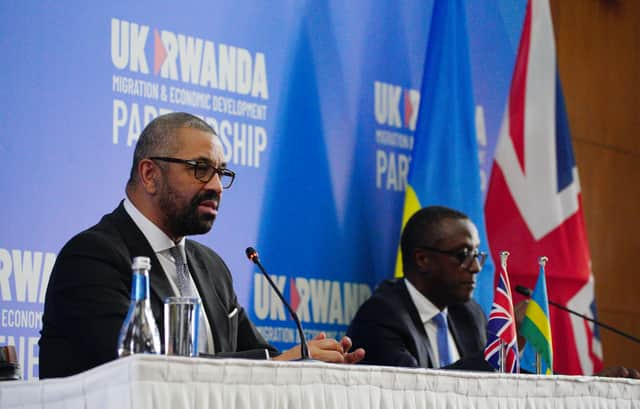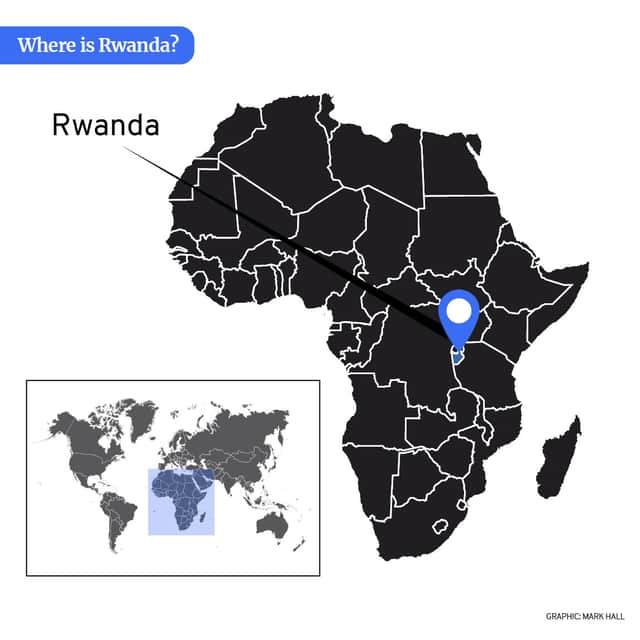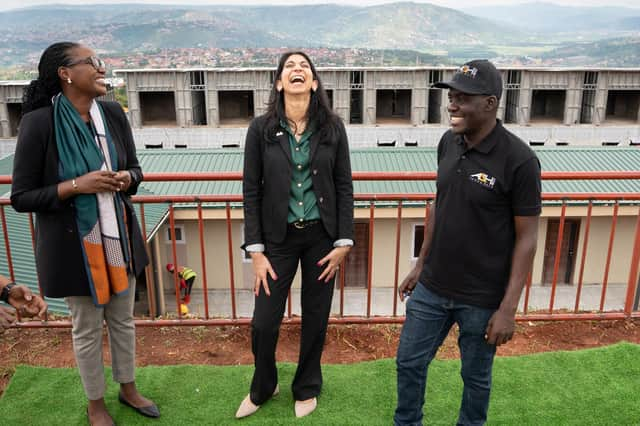Why Rwanda for UK's asylum plan? James Cleverly signs new treaty in Kigali - is it safe for refugees?
and live on Freeview channel 276
The Home Secretary, James Cleverly, has signed a new treaty with Rwanda which he hopes will revive the government's stalled asylum plan.
Rishi Sunak wants to send asylum seekers to the east African nation for processing and resettlement, which he hopes will deter migrants from making small boats crossings over the Channel. However, this was declared unlawful last month by the Supreme Court due to issues with Rwanda. Charities have questioned the effectiveness of the scheme.
Advertisement
Hide AdAdvertisement
Hide AdThe government hopes that a new treaty with Rwanda will make the plan legally watertight, and the Home Office has been negotiating this for several months. Cleverly met his counterpart, Vincent Biruta, in Kigali to sign the treaty and discuss key next steps on the so-called migration and economic development partnership.
The treaty – which needs to be ratified by both the UK and Rwandan parliaments to make it internationally binding – seeks to make sure the African nation does not remove migrants who had arrived via the UK and send them back to their home country, or another country. Some British and Commonwealth judges will preside over hearings in Rwanda, if Kigali wants to deport an asylum seeker for any reason, i.e. committing a crime.


Cleverly said the UK was “proud” to be a long-standing partner of Rwanda’s endeavour to ensure the “robustness” of its judicial system “is clearly on display”. Speaking at a press conference in Kigali, he said: “Your country has made a clear and unambiguous commitment to the safety of people who come here. That has been displayed and we have seen that in practice.
“You’ve also made a strong commitment to work with the UK and international partners in order to make sure that the robustness of your judicial system is clearly on display, and we are very proud to be a long-standing partner in that endeavour.”
Advertisement
Hide AdAdvertisement
Hide AdDomestic legislation, which will be rushed through Parliament to assert Rwanda is a safe destination for asylum seekers who arrive in Britain, could be laid this week. Ministers hope the upgraded agreement, along with the “emergency” legislation, will address the issues that led the UK’s highest court to rule the scheme unlawful.
Sunak said he was “fed up with our Rwanda policy being blocked” and the emergency laws will “end the merry-go-round so that we can fix this problem once and for all – and stop the boats”. Writing in The Sun, he said: “People looking at this country have got to know that if they come here illegally, they will be detained and swiftly removed to a safe country.”
So far the government has paid £140 million to Rwanda and not a single flight taken off. This money cannot be recouped in the event the policy continued to be declared unlawful. Reports that an additional £15 million would be paid along with the treaty were denied by Rishi Sunak's official spokesman.
Why is the UK government using Rwanda for the asylum plan?
The government hopes that by sending asylum seekers to Rwanda, it will deter small boat crossings across the Channel. The idea is that if refugees knew they were going to be deported to the east African country, they would not making the treacherous journey. More than 27,000 people have crossed the Channel this year, with 45,755 coming in 2022.
Advertisement
Hide AdAdvertisement
Hide AdThe Home Office had to find a country that would both act as a deterrent, be considered safe and accept asylum seekers from the UK. The government believes that Rwanda ticks the boxes, however the Supreme Court ruled this as unlawful due to specific issues with the east African country and its justice system.
Charities such as the British Red Cross have refuted the Home Office’s claims that the policy will succeed in stopping Channel crossings, arguing that “deterrence policies don’t work and will never solve the asylum seeker crisis”.


Is Rwanda safe for refugees?
The government has consistently claimed that Rwanda is safe for Refugees. Before heading to Kigali, Cleverly said: “We are clear that Rwanda is a safe country, and we are working at pace to move forward with this partnership to stop the boats and save lives.
“The Supreme Court recognised that changes may be delivered in future to address the conclusions they reached – and that is what we have set out to do together, with this new, internationally recognised treaty agreement. Rwanda cares deeply about the rights of refugees, and I look forward to meeting with counterparts to sign this agreement and further discuss how we work together to tackle the global challenge of illegal migration.”
Advertisement
Hide AdAdvertisement
Hide AdPreviously, former Home Secretary Suella Braverman visited Rwanda and joked about the houses that had been built for asylum seekers: “These houses are really beautiful, great quality, really welcoming, and I really like your interior designer. I need some advice for myself.” Government sources have also made the point that the UNHCR, the UN's refugee agency, which gave evidence to the Supreme Court criticising Sunak's plan, has sent asylum seekers from Libya to Rwanda.


However, despite representations from the Home Office, the Supreme Court ruled against the plan last month. The five justices - who form the highest court in the land - said they were concerned that genuine asylum seekers were at risk of being returned to their home countries, where they would potentially be in danger, which is known as “refoulement”. The Supreme Court said this was unlawful under several international treaties that the UK has signed, and also goes against domestic law.
A key part of the evidence came from the UNHCR, which found that Israel had entered a similar agreement with Rwanda, and "asylum seekers were routinely moved to a neighbouring country where they were likely to be refouled".
In their ruling, which the other justices agreed with, Lords Reed and Lloyd-Jones said: "The central issue in the present case is therefore not the good faith of the government of Rwanda at the political level, but its practical ability to fulfil its assurances, at least in the short term, in the light of the present deficiencies of the Rwandan asylum system.”
Advertisement
Hide AdAdvertisement
Hide AdThe Supreme Court justices later said there was “evidence of a culture within Rwanda of, at best, inadequate understanding of Rwanda’s obligations under the Refugee Convention”. Rwanda is also effectively a dictatorship, with the ruling party in place since the genocide in 1994. Paul Kagame has been President since 2000. A report by Human Rights Watch in 2021 found that "it is not unusual for Rwandan journalists to go missing, or end up dead in mysterious circumstances".
When asked by NationalWorld, the Prime Minister's spokesman did not deny Rwanda could be called a dictatorship. He said: "Rwanda is a safe country, a vital partner to the UK even beyond the migration partnership. It's not just the UK that works with them [Rwanda] but the UNHCR too."
What does the new treaty with Rwanda say?
The new treaty has a non-refoulement clause, which the government hopes will satisfy the Supreme Court and stop any future legal challenges. This will mean asylum seekers will stay in Rwanda, through permanent residency, even if their claims are rejected. The government says they will be given housing, education and language training.
As part of the treaty, asylum seekers get free legal assistance at all stages of the process, and a new appeals system will be set up. Home Office sources say UK experts will assist with this, and it will be run by two co-presidents, one from Rwanda and one from the Commonwealth. They will appoint appeals judges from around the world, who have refugee and asylum experience.
Advertisement
Hide AdAdvertisement
Hide AdAn independent monitoring authority, set up to oversee the policy between the two countries, will meet regularly in a bid to bolster the level of scrutiny the scheme is given, officials say. The treaty gives this additional assurances and allows anonymous complaints from asylum seekers and their legal representatives.
Speaking at the press conference in Kigali, Cleverly said: "The UK and Rwanda are working on this because it is important, not because it is necessarily easy or that it buys you cheap or quick popularity.
“We do this despite the fact that it is difficult and sensitive, because if we don’t address these issues, the people that will ultimately be the winners are the people smugglers, they are the slave traders, they are the criminal gangs… Rwanda is stepping forward to be a thoughtful and careful partner in solving these incredibly difficult international issues."
This morning, Downing Street said the Cleverly dialled in to Cabinet from Kigali to update on the new treaty, saying that it was the strongest possible agreement with Rwanda. He claimed this goes far beyond that of the UNHCR’s own asylum deal with Rwanda.
Advertisement
Hide AdAdvertisement
Hide AdWhile Immigration Minister Robert Jenrick told Cabinet that the arrangements now in place provide strong and substantive assurances that are more robust than those considered by the Supreme Court.
Ralph Blackburn is NationalWorld’s politics editor based in Westminster, where he gets special access to Parliament, MPs and government briefings. If you liked this article you can follow Ralph on X (Twitter) here and sign up to his free weekly newsletter Politics Uncovered, which brings you the latest analysis and gossip from Westminster every Sunday morning.
Comment Guidelines
National World encourages reader discussion on our stories. User feedback, insights and back-and-forth exchanges add a rich layer of context to reporting. Please review our Community Guidelines before commenting.
